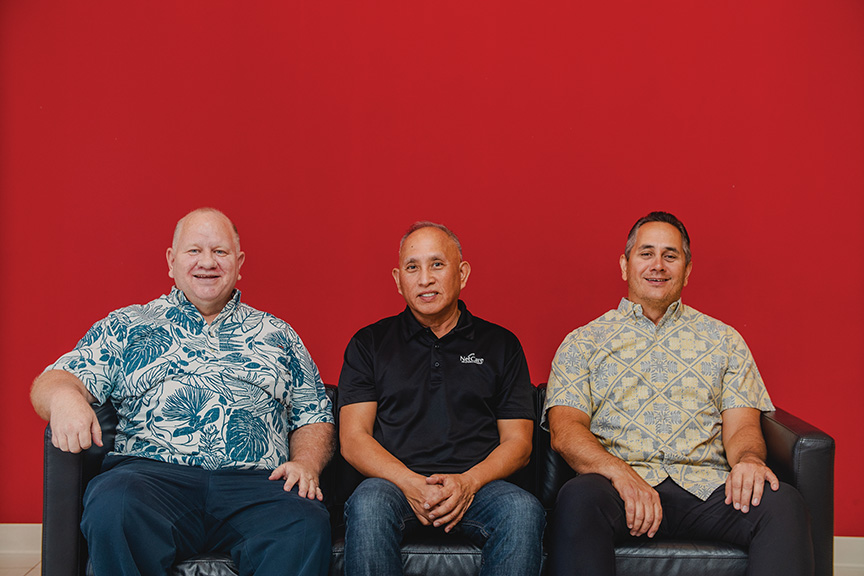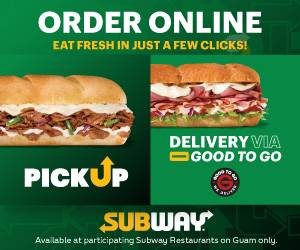
(From left) Miki R. Moylan, director of Property & Casualty, Moylan’s Insurance Underwriters; Jerry Crisostomo, plan administrator and manager of health plans, NetCare Life & Health Insurance Co.; and Troy K. Moylan, director of Life and Health, Moylan’s Insurance Underwriters.
By Maureen N. Maratita and Morgan Legel
Many companies with headquarters in Guam do business in other islands in the Micronesian region. They have seen COVID-19 affecting multiple business and residential clients as the adverse economic effects of the pandemic continue.
Leading executives in the insurance sector have contributed to an industry panel and share the following insights.
How have clients reacted to COVID-19?
David E. Silva, general manager, AB Risk Micronesia: “Like everyone affected by the pandemic, many of our clients closely considered their spending priorities and weighed the risks of reducing their insurance or letting it lapse altogether. Some have bought a bare minimum insurance to satisfy banks and vendors, and others with significant property risks kept insurance levels commensurate with the risk. Fire, typhoon and earthquake risks didn’t go away with the pandemic. We have kept close contact with businesses that let their insurances lapse, in hopes of supporting their return when tourism reopens.”
Annmarie T. Muna, president and general manager, AM Insurance: “We have received multiple requests from our commercial clients to provide reduced premium terms, due to the decrease in revenues and payroll experienced this past year. With regards to our personal lines, most clients are not so much seeking reduced premiums as opposed to extension of payment terms.”
Frank Campillo, health plan administrator, Calvo’s SelectCare, Calvo’s Insurance Underwriters Inc.: “The main effect on cutting back has been the reduction of full time employees in the island’s key industry, which translates to lower numbers of insured individuals.”
Brent Butler, general manager, Nanbo Insurance Underwriters Inc.: “Clients have reacted by looking for ways to reduce costs. In some cases, clients have opted to self-insure some of their assets (provided there was no bank-mandated insurance requirement), increase their policy deductibles and or reduce their coverage limits to help reduce their premiums. Several businesses which were not permitted to operate during the lockdown such as daycares and restaurants discontinued some of their coverages while they were closed. Basically, customers having to stay home had reduced the need for certain policies and thus provided clients the opportunity to reduce coverage amid financial difficulty.”

Crisostomo
Jerry Crisostomo, plan administrator and manager of health plans, Moylan’s NetCare, Moylan’s Insurance Underwriters Inc.: “I believe our customers, providers and clients have complied well with the safety measures and protocols required to stay safe and healthy. Although, NetCare did not reduce premiums due to the increase in medical costs, we made a business decision to retain premium rates for most of our current or renewal clients during the past year. As a result, NetCare was able to achieve a 99% renewal persistency with its current market.”
Arvin C. Lojo, health plan administrator, TakeCare Insurance Co. Inc.: “Employer groups have either laid off or furloughed employees and/or reduced their benefit coverage to help manage their premiums and cut expenses.”

(From left) Annmarie T. Muna, president and general manager for AM Insurance; Arvin C Lojo, health plan administrator, TakeCare Insurance Co. Inc.; and Marilou G. Dimalanta, senior manager for Calvo’s SelectCare Health Plans.
Is there new business to be had?
David E. Silva: “In Guam there is still construction and commercial activity, both on and off base. In Saipan, we’re seeing small family style restaurants seeking quotes and there is growing interest from companies looking to enter Saipan’s new cannabis industry. Surprisingly, people are still buying new cars in Guam.”

Muna
Annmarie T. Muna: “Despite the pandemic, new businesses and new entrants to the commercial arena continue. In addition, we have experienced a major uptick in home insurance placements, which we attribute to the extremely low mortgage rates brought on by the conditions surrounding the pandemic.”
Frank Campillo: “Federal related projects continue to increase in size and numbers, which provides access to new business opportunities in the insurance sector.”
Brent Butler: “Yes. During the pandemic, many people started their own side business such as jewelry making or baked goods retailer. Food delivery services also became very popular. Furthermore, with many employees forced to work from home, cyber risks became even more important. Cybersecurity, and by extension, cyber liability may have to extend to the employees’ homes.”
Jerry Crisostomo: “Despite the pandemic resulting in several business closures, NetCare Health was able to generate new business sales exceeding $1.2 million in 2020. These new business sales came from a combination of existing businesses as well as new business ventures started during the pandemic months.”
Arvin C. Lojo: “Yes. There are some new businesses and entrants to the market, especially from the construction industry.”

(From left) David E. Silva, general manager and Percival Acejo, senior accounts broker; both from AB Risk Solutions; and Brent Butler, general manager of Nanbo Insurance Underwriters.
Has the pandemic spurred the use of new technology? Do you see some clients seeking quotations on-line or to pay online?
David E. Silva: “We recently moved to a new cloud-based IT platform that allows our teams to work remotely. We never lost contact with our clients. We are looking at more automation in our business in the near future, bringing self-service and online paying features to our clients. Zoom and Microsoft Teams are the new norms for client meetings, but nothing beats shaking a hand, and a good face to face lunch with clients.”
Annmarie T. Muna: “The extenuating result of the pandemic has really opened our eyes on progressing our business operations to meet the needs of our clients. We have been forced to adapt and create technological ease of access for our employees to efficiently and expediently address our clients requests.”

Campillo
Frank Campillo: “We have enhanced our digital offerings to protect both members and our employees and have enhanced our digital communications both virtual and static. Our technology enhances include on-line payments, virtual meetings and smart applications.”
Brent Butler: “Very much so. We have had to re-direct our customers to digital channels for information, service and inquiries, where possible. The use of touchless services such as online payments, payments over the phone and online quotes has increased substantially. Furthermore, the number of face-to-face meetings with our customers and prospects decreased quite a bit since the pandemic started and we have opted for using online platforms such as Zoom and GoToMeeting.”
Jerry Crisostomo: “The pandemic has actually pushed up our plans to implement more online tools for customers and providers to engage with our business operations. For example, new online tools included online premium payments, electronic billing statements, electronic pre-certification, electronic claims submittals as well as electronic provider payments etc. NetCare will soon implement a new off-island medical referral portal as well as an online enrollment portal.”
Arvin C. Lojo: “Yes. TakeCare has implemented virtual and online solutions to provide services to its members and employer groups. We have provided options for those seeking online quotations and pay services virtually.”
With reduced traffic on the road in 2020, were there fewer accident claims? There have been reports that repair costs have increased. Have you found this to be the case?
David E. Silva: “We did notice a reduced frequency of auto claims — for most of 2020, traffic was visibly reduced.”

Butler
Annmarie T. Muna: “During the initial lock down we did see a noticeable decrease in automobile accident claims. However, with the ease of restrictions we have noticed claims steadily increasing.”
Brent Butler: “Yes, there was a substantial decrease in automobile accident claims during 2020 due to the reduced traffic on the road. We have noticed a select few auto repair shops have increased their labor rates, but the other repair shops that have low overhead costs have maintained the same rates during the pandemic.”
Have health insurance claims been reduced due to a reluctance to visit hospitals and clinics for treatment, or to travel off-island at various points in 2020?
Frank Campillo: “Claims have been reduced somewhat in the area of outpatient procedures, but this could translate into larger and more severe cases in the future.”
Brent Butler: “Yes. The pandemic’s restrictions resulted in fewer elective procedures and consultations. As a result, the volume of health insurance related claims declined in 2020. However, this reduction in claims volume is expected to be short-term.”

Lojo
Jerry Crisostomo: “Although, non-COVID medical expenses decreased slightly from March 2020 to December 2020, the increase in claims expenses were primarily from COVID related expenses such as testing and treatment due to COVID infections on both an outpatient and inpatient basis.”
Arvin C. Lojo: “Insurance claims have been reduced because of the limitation to travel and/or unwillingness from members/patients to visit hospitals and clinics. We have started noticing that the number of services and related costs have increased since restrictions were lifted.”
Have you seen any other noticeable changes in the market related to claims, such as theft?

Silva
David E. Silva: “There has been an increase in car thefts and break-ins and crime in general. Business fleets and properties left shut down found the attention of criminals.”
Annmarie T. Muna: “I think with most things, when you address one concern it usually gives rise to a to another. However, while we expected it, we did not see an increase in vandalism and theft claims. I believe the restrictions in place kept most people at bay and therefore no chaos arose in these areas.”
















